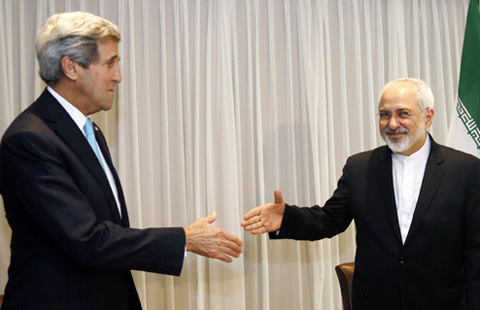Getting overseas strategies right
Updated: 2015-01-18 03:07
By LIAN ZI In San Francisco(China Daily USA)
|
||||||||
 |
|
Jonathan Li, CEO of the music and picture-sharing site Vibin, shares the latest data about the Internet and smartphone users to the gathering at the Julian's restaurant in San Francisco Thursday night. Lian Zi / China Daily |
Startups trying to enter the Chinese mobile market should team up with the right partners, hire the right people and sell the right product.
That was the message from Volker Heistermann who has been involved in mobile, technology and startups during 15 years in Silicon Valley and for the past five years in the Chinese mainland and Taiwan as a co-founder of Yushan Venture.
He spoke at the networking event "The China Dream" on hursday night in Julian's restaurant in San Francisco. Co-organized by Yushan Venture and theMobile World Congress Shanghai, a mobile association that hosted the Mobile World Congress in Barcelona and in Shanghai, the event was held toeducate US startups and small businesses about how to scale up quickly by expanding into China's emerging market. More than 30 venture capitalists and entrepreneurs of venture-backed startups attended the event.
"We want toshowcase that China is an innovative country, provide an overview of the mobile ecosystem and discuss the opportunities for foreign startups and enterprises to do business in China's mobile space," said Heistermann.
People know that China is a big market for mobile-related products, but don't really know how big it is, saidJonathan Li, CEO of the music and picture-sharing site Vibin.
China has more than 600 million Internet users, almost twice the entire population of the United States. Among them, more than 500 million peopleuse smartphones or advanced feature phones as their primary means of going online, according to eMarketer, a New York-based marketing statistics and data provider.
Li also spoke about the "next big thing" in the mobile industry: mobile payment. He said it has a very bright future in the Chinese market. In the US, more than 90 percent of consumers are mobile-payment users, but only 55 percent of Chinese people actively use e-payment tools.
Even though China presents abundant opportunities, doing business there is still hard for foreign SMEs (small and medium-sized enterprises), said Heistermann.
Besides the language barrier, there are challenges such as dealing with government relations, he said. To make it easier, foreign companies should partner with local players for their extensive knowledge of how the system works.
Finding a trustworthy partner also is critical, he said, because there is concern among foreign companies about possibly losing intellectual properties in China.
"You don't really want a partner that doesn't only bring you there, but also takes everything you have and then closes the door," said Heistermann.
Foreign companies have a chance to succeed in China as long as they have a product that is better than an existing one and can offer extra value since competition in China is very fierce, he said.
"In China, companies can only survive from two ends. As the cheap products have already existed, it is easier for foreign players coming to the market with high-end or luxury products," according to Heistermann.
Putting together a local team or having staff on-the ground to oversee operations there were his last two suggestions.
The strategy is also the same for Chinese mobile companies who plan to do business in the US, said Heistermann.
It is very fascinating to see numbers of China's SMEs going out, especially at the Consumer Electronic Show (CES) in Las Vegas. However, not all of them did great jobs there, since some small companies don't know how to market themselves, he said.
"Some Chinese SMEs only buy a cheap table with poor marketing materials that have too many words on it. It is very hard to send out, so they probably need to hire or collaborate with local PR agencies and organize engagement events and certain activities to boost their awareness. If they just come and don't speak English well, it is only a waste of money. It is better to walk around,activelytalk to people and hand out their business cards,"Heistermann suggested.
zilian@chinadailyusa.com
Most Viewed
Editor's Picks

|

|

|

|

|

|
Today's Top News
HK donor gives $1 million to NYPD officers' families
Congresswoman warns of immigration scams
Silicon Valley will mark Spring Festival
Beverly Hills rolls out red carpet for Chinese tourists
US rebound should lift China
Miami to China: Come see about us
Teens to face trial in killing of Chinese student
Chinese piece headlines Carnegie recital
US Weekly

|

|















